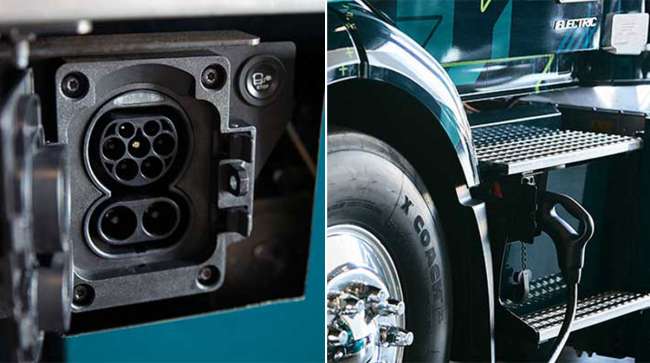Staff Reporter
Volvo Helps Expand Options for Electric Truck Charging

[Stay on top of transportation news: Get TTNews in your inbox.]
Volvo Trucks North America took a step toward the widespread usage of electric trucks by expanding charging options, the company announced Aug. 26.
The Combined Charging System CCS2 connector was designed around the unique needs of medium- and heavy-duty electric trucks. The Volvo LIGHTS project and its partners secured a safety certification for the system, which means more charging options for fleet operators.
“There is a great deal of enthusiasm and interest from the prospective customers that are saying, how do I get started?” Keith Brandis, vice president of partnerships and strategic solutions at Volvo Group, told Transport Topics. “Officially we have not made our commercial launch. That’s going to happen later.”
Volvo LIGHTS is a collaboration among different organizations to develop a blueprint to successfully introduce battery-electric trucks and equipment into the market at scale. REMA EV Connections manufactures the charging system and is one of the partners on the project.
The Underwriters Laboratories verified that the charging system meets North American safety standards. This certification enables fleet operators to purchase the system directly from suppliers such as Volvo LIGHTS vendor ABB.

Natural gas and propane join electric power as alternatives to diesel. Host Seth Clevenger talks with Chad Lindholm of Clean Energy and Stuart Weidie of Alliance Autogas. Hear a snippet, above, and get the full program by going to RoadSigns.TTNews.com.
“Electrification of commercial trucks will provide enormous benefits to businesses and to their customers,” said Genevieve Cullen, president of the Electric Drive Transportation Association. “Innovative collaborations, like Volvo LIGHTS with its partners, including Southern California Edison and ABB, will expand infrastructure options, speed the uptake of medium- and heavy-duty electric vehicles and accelerate electrification throughout the transportation sector.”
Fleet operators previously had to go through a complex field certification process after the chargers were installed. The UL certification also paves the way for utilities and other agencies to expand their list of approved charging options for electric vehicle fleet infrastructure programs.
Brandis said that different types of connectors have emerged over the years despite talks of having a common system. This has to do with many factors such as different battery sizes and how some systems are proprietary, including what Tesla uses.
“So we saw a divergence and multiplication of different connectors,” Brandis said. “When we began talking about heavy-duty trucks what we saw was customers have much larger battery packs on board these trucks in order to get the range and performance that is expected for local and regional haul deliveries. Therefore we needed to have faster charging.”

Brandis
DC current based connectors was one of the ways in which the system could have higher voltage and be faster overall.
“There’s two parts to it,” Brandis said. “There’s the top round receptacle with a number of plugs that are mainly for AC. Then there are two larger pins on the bottom for DC. But it is the same connector, both on the cable side from the charging unit and on the truck side where it plugs in.”
The Combined Charging System CCS2 connector doesn’t just have a faster charging time. The system can be used by different types of electric truck adapters. It also has a software interface that communicates with the charger and the connected truck.
Brandis said it’s also important to consider there are many different players between utility companies and truck manufacturers who are needed to build the infrastructure for electric vehicles. An issue at the moment is there isn’t much in the way of public charging stations.
“The current situation is behind the fence,” Brandis said. “That being private property. There are no public charging stations available yet. We are working with a company called Trillium (they are a division of Love’s Travel Stops) to build the first public heavy-duty truck charger available to anyone that wants to use it.”
Want more news? Listen to today's daily briefing:
Subscribe: Apple Podcasts | Spotify | Amazon Alexa | Google Assistant | More




